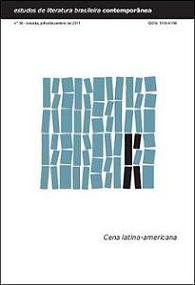Transgredir o gênero:
políticas da escritura na literatura hispano-americana atual
DOI:
https://doi.org/10.1590/2316-4018381Abstract
Esse artigo propõe uma reflexão sobre políticas de escritura da literatura hispanoamericana atual que trabalham nas margens das formas estéticas institucionalizadas, socavando as convenções do gênero literário. Para tanto, analisamos os romances de Mario Bellatin, que se deslocam com irreverência entre a autobiografia e a ficção, e os livros raros que organiza Diamela Eltit, nos quais modela a matéria do testemunho em sintonia com seu universo ficcional. A partir da noção foucaultiana de transgressão, abordamos essas formas estéticas como políticas de escritura que resistem ao encerramento da palavra literária na transparência natural dos limites de gênero.
Downloads
References
ARFUCH, Leonor (2002). El espacio biográfi co: dilemas de la subjetividad contemporánea. Buenos Aires: FCE.
BARTHES, Roland (2006). El grado cero de la escritura: Buenos Aires - siglo XXI.
BELLATIN, Mario (2005a). Lecciones para una liebre muerta. Barcelona: Anagrama.
______ (2005b). “Underwood portátil modelo 1915”. In: Obra reunida. México: Alfaguara.
______ (2007). El gran vidrio: tres autobiografías. Barcelona: Anagrama.
BOLAÑO, Roberto (2008). “Derivas de la pesada”. In: Entre paréntesis: ensayos, artículos y discursos (1998-2003). Barcelona: Anagrama. p. 23-39.
CATELLI, Nora (2007). En la era de la intimidad. Rosario: Beatriz Viterbo.
CHEJFEC, Sergio (2005). “Breves opiniones sobre relatos con imágenes”. In: El punto vacilant: literatura, ideas y mundo privado. Buenos Aires: Norma Editorial.
DERRIDA, Jacques (1980). “La loi du genre”. Critical inquiry. n. 7, p. 176-201.
ELTIT, Diamela (1983). Lumprécia. Santiago: Ed. del Ornitorrinco.
______ (1989). El padre mío. Santiago: Francisco Zegers.
______ (2004). Mano de obra: tres novelas. México: FCE.
______ (2005). Puño y letra: juicio oral. Santiago: Seix Barral.
______ (2008). “Enunciar, anunciar, denunciar: el arte como archivo”. In: Signos vitales: escritos sobre literatura, arte y política. Santiago: Ediciones Universidad Diego Portales, p.222-5.
FOUCAULT, Michel (1964). “Préface à la transgression”. In: Dits et écrits. Paris: Gallimard. v. 3, p. 233-61.
GIORDANO, Alberto (Org.) (2010). “Presentación”. Los límites de la literatura. Rosario: Centro de Estudios de Literatura Argentina. p. 5-16.
SARLO, Beatriz (2005). Tiempo pasado: cultura de la memoria y giro subjetivo. Una discusión. Buenos Aires: Siglo XXI.
STAROBINSKI, Jean (2008). “El progreso del intérprete”. In: La relación crítica. Buenos Aires: Nueva Visión. p. 77-84.
VOLPI, Jorge (2008). “De parásitos, mutaciones y plagas”. In: Mentiras contagiosas. Madrid: Páginas de Espuma. p. 23-37.
Downloads
Published
How to Cite
Issue
Section
License
Authors who publish in this journal agree to the following terms:
a) The authors maintain the copyright and grant the journal the right of first publication, the work being simultaneously licensed under the Creative Commons Attribution License-Non Commercial 4.0 which allows the sharing of the work with acknowledgment of the authorship of the work and publication this journal.
b) Authors are authorized to enter into additional contracts separately, for non-exclusive distribution of the version of the work published in this journal (eg publish in institutional repository or as a book chapter), with authorship recognition and publication in this journal.
c) Authors are allowed and encouraged to publish and distribute their work online (eg in institutional repositories or on their personal page) after the editorial process, as this can generate productive changes, as well as increase the impact and citation of published work (See The Effect of Free Access).
d) The authors of the approved works authorize the magazine to, after publication, transfer its content for reproduction in content crawlers, virtual libraries and the like.
e) The authors assume that the texts submitted to the publication are of their original creation, being fully responsible for their content in the event of possible opposition by third parties.


